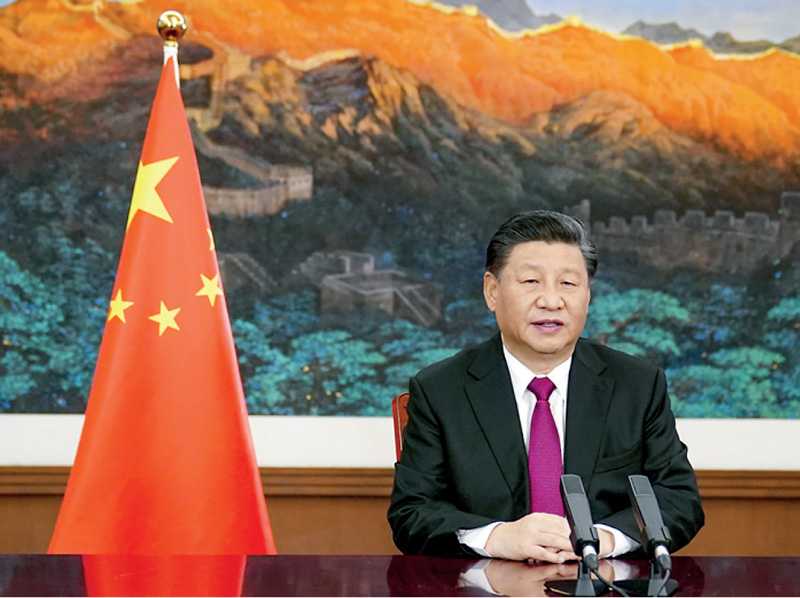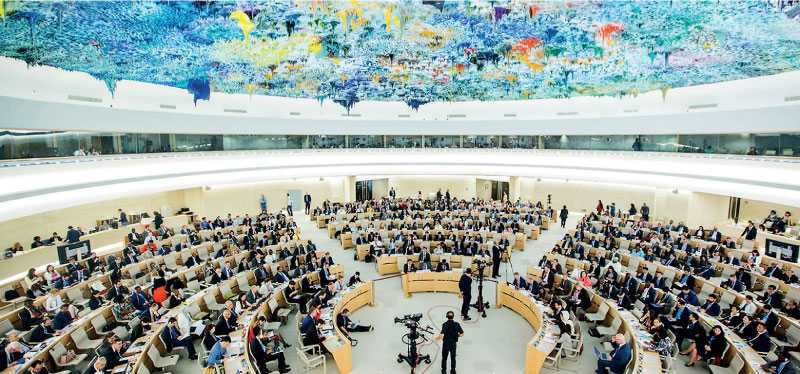Wednesday Feb 25, 2026
Wednesday Feb 25, 2026
Monday, 22 February 2021 00:00 - - {{hitsCtrl.values.hits}}

In his speech, President Xi emphasised that the problems facing the world are intricate and complex. The way out of them is through upholding multilateralism and building a community with a shared future for mankind
 Since last year, the COVID-19 pandemic has severely threatened global public health and economic development, and it has also posed severe challenges to how governments can effectively protect human rights.
Since last year, the COVID-19 pandemic has severely threatened global public health and economic development, and it has also posed severe challenges to how governments can effectively protect human rights.
As of 20 February, 110 million people have been diagnosed and 2 million people have died from the coronavirus around the world. The International Monetary Fund predicts that global GDP will decline by 4.4% in 2020.
The World Bank estimates that more than 100 million people worldwide have returned to poverty due to the epidemic. Mankind is experiencing a huge crisis rare in history. During the crisis, unilateralism was on the rise for a while, but in the end it was proven failed badly, and the torch of multilateralism can only guide us in this dark fog.
Meanwhile, it must be noted that different kinds of multilateralism are emerging in the world. In the name of multilateralism, some practice unilateralism and impose rules formulated by a few countries on the international community. Some even ideologicalise multilateralism and create so-called ‘value alliances’ for specific countries, which deserves our high alert.
From the Davos Agenda event held by the World Economic Forum in January this year to the 46th session of the United Nations Human Rights Council that will open in Geneva this week, the international community has been focusing on one question: “What kind of multilateral do we need?”
At the Davos Agenda event, as the only major economy that successfully responded to the COVID-19 and achieved economic growth in the world, Chinese President Xi Jinping delivered a speech titled ‘Let the Torch of Multilateralism Light up Humanity’s Way Forward’, which has been highly valued and widely praised by the international community.
In his speech, President Xi emphasised that the problems facing the world are intricate and complex. The way out of them is through upholding multilateralism and building a community with a shared future for mankind. He also clearly put forward China’s four-point initiative on defending multilateralism as follows.
First, we should stay committed to openness and inclusiveness instead of being closed off and exclusionary. Multilateralism is about having international affairs addressed through consultation and the future of the world decided by everyone working together. We cannot tackle common challenges in a divided world, and confrontation will lead us to a dead end.
The right approach is to act on the vision of a community with a shared future for mankind. We should uphold the common values of humanity, i.e. peace, development, equity, justice, democracy and freedom, rise above ideological prejudice, make the mechanisms, principles and policies of our cooperation as open and inclusive as possible, and jointly safeguard world peace and stability. We should build an open world economy, and uphold the multilateral trading regime.
Second, we should stay committed to international law and international rules instead of seeking one’s own supremacy. International governance should be based on the rules and consensus reached among us, not on the order given by one or the few.
Without international law and international rules that are formed and recognised by the global community, the world may fall back to the law of the jungle, and the consequence would be devastating for humanity. ‘Selective multilateralism’ should not be our option.
Third, we should stay committed to consultation and cooperation instead of conflict and confrontation. Differences in history, culture and social system should not be an excuse for antagonism or confrontation, but rather an incentive for cooperation. We should respect and accommodate differences, avoid meddling in other countries’ internal affairs, and resolve disagreements through consultation and dialogue.
We should reject the outdated Cold War and zero-sum game mentality, adhere to mutual respect and accommodation, and enhance political trust through strategic communication. It is important that we stick to the cooperation concept based on mutual benefit, and stop unilateral practice of keeping advantages in development all to oneself. We should advocate fair competition, like competing with each other for excellence in a racing field, not beating each other on a wrestling arena.
Fourth, we should stay committed to keeping up with the times instead of rejecting change. To uphold multilateralism in the 21st century, we should promote its fine tradition, take on new perspectives and look to the future.
We need to stand by the core values and basic principles of multilateralism. We also need to adapt to the changing international landscape and respond to global challenges as they arise. We need to reform and improve the global governance system on the basis of extensive consultation and consensus-building.
China has always been upholding and practicing multilateralism and promoted the building of a community with a shared future for mankind. 2021 is the first year of China’s ‘14th Five-Year Plan’ and its new journey to comprehensively build a modern socialist country. It is also the 50th anniversary of China’s restoration of its legal seat in the United Nations and the 100th anniversary of the founding of the Communist Party of China.
President Xi reiterated in his speech that China will continue to take an active part in international cooperation on COVID-19, continue to implement a win-win strategy of opening-up, continue to promote sustainable development, continue to advance science, technology and innovation, and continue to promote a new type of international relations.
Regarding international human rights issues, China believes that multilateralism and win-win cooperation are of great significance, reflecting the common aspirations and wishes of developing countries, and conforming to the general development trend of global human rights governance.
Sri Lanka is located at the centre of the Indian Ocean, connecting east and west, and has never been an isolated island. In the current changes in the world and the pandemic of the COVID-19, Sri Lanka is also unable to survive alone. Whether it is pandemic control and vaccination, or realising national development and reducing poverty, or defending its independent sovereignty and promoting human rights issues, Sri Lanka needs assistance and support of the international community.
There is only one earth and one shared future for humanity. Facing with the current crisis, we firmly oppose the politicisation of public health issues and the politicisation of human rights issues. As we endeavour to make a better day for everyone, let us all join hands and let multilateralism light our way toward a community with a shared future for mankind.

(The writer is the Ambassador of China to Sri Lanka.)